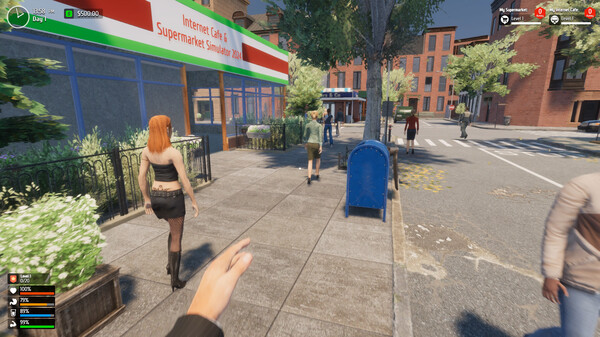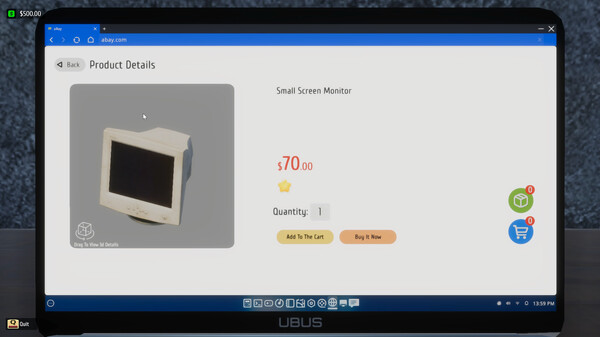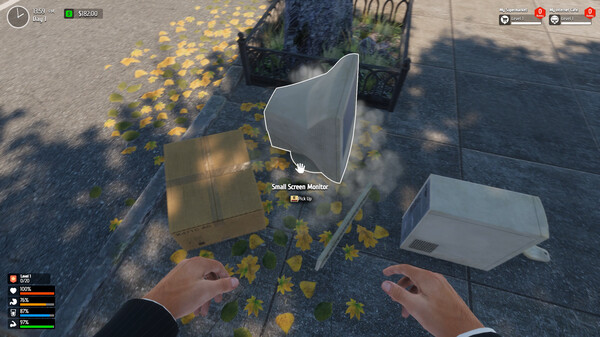Internet Cafe & Supermarket Simulator 2024, developed and published by SmartPlayGames, is a hybrid management simulator that combines two of the genre’s most popular subthemes—running an internet café and operating a supermarket—into a single, interconnected experience. It aims to immerse players in the day-to-day challenges of building, managing, and expanding a dual business empire where technology and retail meet. At its core, the game is about multitasking, resource management, and strategic growth. You begin as a small-time entrepreneur with limited funds and an empty space, gradually transforming it into a bustling center of activity where customers browse, shop, and surf the web under your supervision. It’s an ambitious concept that seeks to merge the meticulous nature of business simulations with the freedom and creativity of open-ended sandbox gameplay. The gameplay starts with humble beginnings. You are given a small amount of capital to set up the first few essentials of your enterprise—installing computers, arranging desks and chairs, stocking basic grocery shelves, and opening your doors to the first wave of curious customers. The systems are designed to interlock: the internet café provides steady income through rentals and computer usage fees, while the supermarket generates cash flow through item sales and product management. This dual structure introduces a satisfying rhythm of work and reward, as you balance between maintaining customer satisfaction on both sides of the business and investing profits into upgrades, decorations, and expansion. Gradually, the player gains access to new furniture, electronics, food products, and decorative pieces that allow for a greater sense of personalization. The appeal lies not only in growing your earnings but also in designing a space that feels vibrant and efficient. Every placement decision, from the angle of a monitor to the layout of supermarket aisles, subtly affects both aesthetics and customer behavior. A major part of the game’s charm is its customization system. SmartPlayGames has provided a surprisingly wide range of options for personalizing your establishment, offering more than a hundred decorative and functional items that can be arranged freely. You can create a minimalist, modern workspace filled with sleek furniture and bright lighting, or embrace a more eccentric atmosphere with neon signs, posters, and eclectic colors. The decoration system also serves a gameplay purpose, as a well-designed and clean environment directly influences customer satisfaction. A messy or unattractive shop discourages visitors, while an appealing setup boosts income and reputation. Cleanliness, in particular, plays a crucial role—customers will litter, spill drinks, and leave messes that must be cleaned either manually or by hired janitors. These details give the simulation a lively sense of realism, where small, routine tasks contribute to the larger economic picture. The management aspect grows increasingly complex as your business expands. Once the initial setup is complete, the player can hire staff to automate certain tasks. Cashiers handle supermarket transactions, cleaners keep the environment tidy, and security guards ensure that the store remains safe from thieves. The internet café side introduces its own nuances, requiring you to maintain computer systems, prevent breakdowns, and manage the flow of customers between workstations. Balancing staffing costs with profit margins becomes a key part of the experience, and strategic upgrades—such as investing in faster computers or more diverse product lines—help optimize earnings. Eventually, the game evolves from hands-on management to a higher-level simulation, where efficiency and automation become the driving forces behind continued growth. This progression offers a satisfying sense of advancement, though it also exposes some of the game’s rougher edges. While the concept is clever and the foundation solid, Internet Cafe & Supermarket Simulator 2024 struggles with a few notable issues. The early game pacing can feel slow, as income accumulates gradually and upgrades require significant investment. Players may find themselves repeating the same tasks for long stretches before unlocking new features. The staff AI also tends to be unreliable—employees sometimes ignore tasks or behave inefficiently, forcing the player to step in manually to correct problems. Stockers might leave boxes piled on the floor, cashiers can freeze up during transactions, and cleaners occasionally overlook obvious messes. These quirks add a layer of frustration to what should be a smoothly running management cycle. Technical hiccups, such as saving errors or minor physics glitches, have also been reported, although patches have improved stability over time. These imperfections don’t ruin the experience but do remind you that the game’s ambition sometimes exceeds its polish. Visually, the game presents a bright, accessible aesthetic. The environments are clean and well-lit, with colorful product packaging, dynamic customer animations, and a variety of furniture styles to mix and match. While the graphics are not particularly detailed, they serve the game’s purpose well, prioritizing clarity over realism. The soundtrack and ambient sound effects contribute to the immersion, with the soft hum of computers, the clinking of shopping carts, and the chatter of customers adding life to the space. The user interface is straightforward, allowing players to navigate between management menus and building tools without much friction. The technical requirements are modest, meaning the game runs smoothly even on lower-end hardware, making it accessible to a wide range of players who enjoy casual simulation experiences. Where the game truly shines is in its ability to create a sense of ownership and progression. Watching your small, empty shop evolve into a busy, profitable business is rewarding, especially as the systems start to interconnect organically. The moment when you can delegate most of the manual labor and focus purely on strategy feels particularly satisfying. The variety of items, combined with the two intertwined business models, keeps things engaging longer than most single-focus simulators. Yet for all its charm, Internet Cafe & Supermarket Simulator 2024 remains a relatively lightweight experience. It lacks the economic depth or long-term challenge of more complex management games, relying instead on its novelty and sense of creative freedom to maintain engagement. Those seeking intricate financial systems or detailed market simulations may find it too simplified, while players who enjoy casual, relaxing simulations will appreciate its approachable, sandbox-like nature. In the end, Internet Cafe & Supermarket Simulator 2024 succeeds in delivering exactly what it promises: a lighthearted yet detailed simulation of running two complementary businesses under one roof. Its blend of creativity, management, and routine creates a loop that is both calming and rewarding, even when slowed down by repetition or minor bugs. The game doesn’t reinvent the genre, but it does expand its boundaries by merging two familiar experiences into something refreshingly different. With a few refinements to pacing, AI behavior, and progression, it could easily stand alongside the more polished simulation titles on the market. As it stands, it offers a solid and engaging experience for players who enjoy gradual growth, customization, and the satisfaction of building something from the ground up—a modest but enjoyable entrepreneurial journey that captures the essence of virtual management in its purest form. Rating: 7/10
Expand the review


























